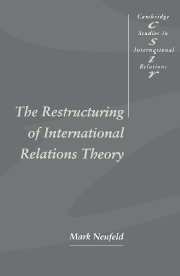Book contents
- Frontmatter
- Contents
- Acknowledgments
- Introduction
- 1 International Relations theory and the Aristotelian project
- 2 Defining positivism
- 3 Reflexivity and International Relations theory
- 4 Human consciousness and International Relations theory
- 5 International Relations theory and social criticism
- 6 Conclusion
- Notes
- Bibliography
- Index
- CAMBRIDGE STUDIES IN INTERNATIONAL RELATIONS
1 - International Relations theory and the Aristotelian project
Published online by Cambridge University Press: 15 December 2009
- Frontmatter
- Contents
- Acknowledgments
- Introduction
- 1 International Relations theory and the Aristotelian project
- 2 Defining positivism
- 3 Reflexivity and International Relations theory
- 4 Human consciousness and International Relations theory
- 5 International Relations theory and social criticism
- 6 Conclusion
- Notes
- Bibliography
- Index
- CAMBRIDGE STUDIES IN INTERNATIONAL RELATIONS
Summary
Perhaps no event has had a more disastrous effect upon the development of political science than the dichotomy between political theory and political science. For it has made political theory sterile by cutting it off from contact with the contemporary issues of politics, and it has tended to deprive political science of intellectual content by severing its ties with the Western tradition of political thought, its concerns, its accumulation of wisdom and knowledge.
Hans J. MorgenthauTo the extent that it is correct to speak of a crisis in science, that crisis cannot be separated from the general crisis.
Max HorkheimerTheory and the ‘global polis’
‘The leading of a good and just life in the polis’ was the ‘Aristotelian telos’ of all political inquiry. Exploring and cultivating public awareness of the basis upon which the citizens of the polis might lead such a life — the ‘Aristotelian project’ — was the task of all responsible students of human society. No other justification for their activity as scholars and teachers was necessary, or, indeed, acceptable.
The nature of the polis was of central concern for those working within the Aristotelian project. In this regard, it is important to note that the polis was not so much a ‘place’ as a ‘way of living’.
- Type
- Chapter
- Information
- The Restructuring of International Relations Theory , pp. 9 - 21Publisher: Cambridge University PressPrint publication year: 1995



